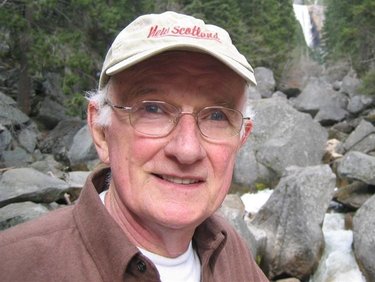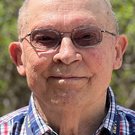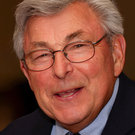Ed Clark
VOORHEESVILLE — Ed Clark led his village and his town for decades, making government inclusive — and fun. He led quietly, by listening.
Although his list of accomplishments is long, what he is most remembered for is the way he built a sense of community.
He died on Friday, May 25, 2018. He was 81.
Ed Clark’s life centered on service: He served two years in the United States Army and was a member of the local American Legion for decades; he was on the Voorheesville Planning Commission for six years, a village trustee for three years, and mayor for 17 years; and he was New Scotland’s supervisor for six years.
Mayor Clark was elected supervisor three times, running on the Republican line in a town and with a board dominated by Democrats. When he first ran for supervisor, he designed a palm card with a list of issues and went door-to-door.
“I went to every single home in town,” he said. He asked residents what they felt were the most important issues, and if there was anything he had missed in his list, he said.
“I learned an awful lot about the town of New Scotland,” said Mayor Clark. “It was very interesting.”
“He was always very interested in other people and their ideas, and not so much talking about his own stuff,” said his son, Tom Clark. “He wanted to know what other people think and feel.”
“He didn’t care about the politics. He cared about doing the right thing,” said his longtime friend Dr. Lyon Greenberg. “He was a Republican but he could see both sides and represent both sides … He didn’t go around yelling and screaming and making a lot of noise — he just got the job done.”
Ed Clark was happiest as the village’s mayor because the village government, as he ran it, was apolitical. When an Enterprise reporter once asked him what the political composition of the village board was, he said that he honestly didn’t know. “We didn’t run on party lines,” Mayor Clark said.
“He ran the village and town governments like he would a community-based organization. That meant everyone’s opinion mattered,” said Kevin Jobin-Davis, who worked for five years as a village grant writer and then served under Supervisor Clark as deputy supervisor.
“When I met him, I was in grad school,” said Mr. Jobin-Davis, “and he would listen to me as he did everyone. He was a consensus decision-maker.”
He went on, “I’m a lifelong Democrat. He was a lifelong Republican … He didn’t see the world through a party lens.”
Mr. Jobin-Davis also described how much Mayor Clark liked his work. “He enjoyed it so much, he made it enjoyable for others. … When he walked into Village Hall, he’d have a dance in his step. We laughed a lot at meetings and we got a lot done.
“The only negative finding he ever had on an audit was because every year, the village would have a volunteer recognition dinner and dance. The state didn’t think that was a worthwhile expense but it was exactly the right way to spend money,” Mr. Jobin-Davis said, likening it to the way not-for-profit organizations reward volunteers to keep them active.
As he retired from his supervisor’s post a decade ago at the age of 71, Mayor Clark said that, despite the frustrations of politics — he ultimately dropped his party enrollment — the experience was still a positive one because he enjoyed the people — the workers at Town Hall and the citizens of New Scotland.
Mr. Clark was able to remain positive in his attitude toward life despite the death of his son Adam. “He took his own life,” Tom Clark said of his brother. “It was the biggest trauma in the family.”
“He never put his burdens on others,” said Mr. Jobin-Davis of Mayor Clark. “He didn’t complain about his own problems and he didn’t complain about other people. He helped others move forward with their ideas … He was a person with a clear path. He followed his values ...What he valued was community; everything else was secondary.”
Family life
Ed Clark was born on Sept. 9, 1936 to an Irish Catholic family living on Staten Island. His father, Robert Clark, ran a gas station and automotive shop, and his mother, Katherine, was a homemaker, raising three children. Ed Clark was their middle child.
“He loved his dog, Cinnamon. She was like Lassie,” said Tom Clark.
As a kid, he also liked riding his bike and “hitting a speed bag like boxers do,” his son said.
His love of dogs and cycling lasted throughout his lifetime, and, as an adult, he had a gym for working out in his basement. His love of ice cream was also important in his life.
His summer job after graduating from public high school was working at an ice-cream parlor. That’s where he met the Staten Island woman, Pat Molokie, who would become his wife.
“My mom wanted an ice-cream flavor they were out of,” said Tom Clark. “My dad said, ‘Well, we have these other flavors.’”
In the end, Mayor Clark talked her into more than ice-cream. Their marriage ended only with his death.
Mr. Clark went to Catholic University in Washington, D.C. where he earned a degree in economics. He then worked for the state’s Department of Labor, and, when he got a promotion, he was given a choice between working in New York City or in Albany. He chose Albany.
He earned a master’s degree at the University at Albany in public relations that led to a job as director of research for the New York State Assembly minority leader, Clarence “Rapp” Rappleyea.
He and his wife settled into a tidy single-story home at 1 Glen St. in Voorheesville. “They lived there for 45 years,” said their son. “He and the neighbors built an addition on weekends.”
The basement became a hangout for the Clarks’ sons, Adam and Tom, and their friends. “It had punching bags, a spot for wrestling, and we’d bring our motorcycles down there in the winter,” said Tom Clark.
“I started with motorcycles and got him into it,” his son said. “For his 50th birthday, we surprised him with a Kawasaki LTD 454 with belt drive. He loved it.”
His son also said, “He loved to read his books, and ride his bike. He never talked about business or politics at home.”
Mayor Clark was a competitive cyclist, Mr. Jobin-Davis said. “He bicycled to his brother’s house in New Hampshire in a day,” he said.
Mayor Clark was also a committed walker and could often be seen walking about the village. “He always went home to have lunch with his wife, and he’d go for a walk,” said Mr. Jobin-Davis.
He supported recreation, backing strong summer recreational programs in the town and village and personally helped maintain the hiking trails at the Holt Preserve and on Bennett Hill. He also supported installing a horseshoe pit in the village’s park.
Mr. Jobin-Davis appreciated Mayor Clark’s quirky penchant for always wearing sandals. “He came to our house at Christmastime to bring gifts to our little girls; he came through the snow wearing sandals.”
Mr. Jobin-Davis went on to say that Mayor Clark wore sandals when he rode his motorcycle. “He even found golf shoes that were sandals,” he said.
Tom Clark described his father as “very frugal, almost austere.” He said, “Dad used coupons … He was a penny pincher.”
“As a retirement hobby he had the liquor store,” said his son, referring to Voorheesville Wine and Liquor, which Mr. Clark owned and operated for a decade. “It was in walking distance from home and he liked talking with the people who came in,” his son said.
Village and town leader
“He was a wonderful, progressive person,” said Lauren Meacham, who worked as Voorheesville’s clerk and treasurer for 16 years. “He introduced our computer system. He got us out of the dark ages.”
She also said, “He had a lot of practical sense for things like budgeting, and he knew who to go to for help. He was a good manager … He looked for new ways to save money like partnering with the town for services.
She concluded, “The village was his forté. The trustees and the employees, we all worked well together; he set up good communication … He was just a nice person.”
Her husband, Donald Meacham, was the village attorney for 27 years. “I first met Ed when he moved into the village and he called me to represent him when he bought his house,” Mr. Meacham recalled. “He became a village board member and eventually ran for mayor. He brought a lot of innovation to village government.”
Mr. Meacham went on, “The good thing about Ed was his ability to diffuse a situation before it got out of hand. He’d go right to the source to talk to both sides. He’d get the fire out before it ignited.”
He also said, “Ed was very loyal to the village and always had its best interests at heart. He had no self-interest at all. He had no personal agenda. He just wanted what was good for the village.”
Although Mayor Clark was quiet, Mr. Meacham said, he had a great, although subtle, sense of humor. “Sometimes you had to look for it,” he said.
He concluded, “He was not confrontational at all. He appreciated the jobs people did. He would quickly correct someone’s mistake rather than make a big issue out of it. I never saw him embarrass, or try to embarrass, anyone.”
Just as Mayor Clark was frugal at home, he was also frugal with village spending. “He looked at the village budget as an extension of everyone’s family budget,” said Mr. Jobin Davis.
Mayor Clark worked with government agencies to get funding for village projects. Mr. Jobin-Davis listed a number of projects that Mayor Clark accomplished this way: Three bridges were replaced with funds from the Federal Emergency Management Agency; state support helped with replacing the sewage treatment plant for Salem Hills; sewer lines were extended and sidewalks were put in with state funding; and, similarly, a new water tank on route 85 helped with pressure throughout the municipal system.
“Ed would not borrow money. Projects got done when you could afford them … He thought his job was to advance the community’s goals in an affordable way,” said Mr. Jobin-Davis.
A state plan for a controversial traffic roundabout in the village showed how Mayor Clark valued transparency in government. “He knew there were strong feelings on both sides,” said Mr. Jobin-Davis. “He had village meetings and had a committee on it. He made it a collective process, all very open.”
“He was really glad how the roundabout turned out,” his son said. “It was largely opposed. He wanted to do whatever worked the best. The planners and designers said this was the thing to do. A lot of the people who didn’t like it said, after it was built, that it was the right thing to do. People told him, ‘I’m sorry I gave you a hard time.’ He liked to please people.”
His son also said Mayor Clark was proud of the flashing signs that warned trucks if they were too high to pass under the railroad bridge over Maple Avenue. “He liked what worked,” said Tom Clark.
“He loved that people pitched in and kept the village tidy,” Tom Clark said.
“He cultivated a positive atmosphere,” said Mr. Jobin-Davis, referencing the thank-you party for volunteers as well as golf outings and poker games for village workers. “There was no talk of municipal business,” Mr. Jobin-Davis said of the poker games. “It bonded people together.”
Mr. Jobin-Davis noted that, when Mayor Clark became New Scotland’s supervisor, he saw the importance of planning and formed the Residents’ Planning Advisory Committee. “Their effort was pretty much ignored,” Ed Clark said as he was retiring. “Politics intruded in that.”
Mr. Jobin-Davis concluded of Mayor Clark’s legacy, “I never heard him say, ‘I want this particular outcome. He wasn’t trying to create something in his image. Still, to this day, people work together well at Village Hall. There’s a lot of humor in meetings and a lot of mutual respect. That’s the ground that Ed laid.”
“At peace”
“His first sign of decline was a stroke he had during a dentist visit. If the dentist hadn’t called the Voorheesville ambulance, he wouldn’t have survived,” said his son. “That was five years ago. We took care of him after the stroke. He walked and rehabbed himself. He loved to walk through the village and wave to people.”
Tom Clark went on, “The love of his life was his 6-year-old grandson, Adama. Adama loves everything with wheels just like his Grandpa did. Grandpa’s walker had wheels. And he loved to jump in his lap and go for rides in his wheelchair.”
Finally, Mayor Clark moved to the Albany County nursing home where he shared a room with his wife. “He was ready to go, to be at peace and be liberated,” said his son.
****
Ed Clark his survived by his wife, Patricia Clark; his son, Tom Clark; and his grandson, Adama Clark.
His son, Adam Clark, died before him.
The family is planning to hold a memorial event for both Ed and Pat Clark after she dies.
— Melissa Hale-Spencer




At the very end of the text, it says that Adama Clark, which is me, has died but that is not true. (I really am his grandson)
Dear Adama,
The obituary names you, Ed Clark's grandson, as a survivor while also listing Ed Clark's son, Adam Clark, as deceased. If this is wrong, please let me know and we will correct it right away.
Sincerely,
Melissa Hale-Spencer
Editor